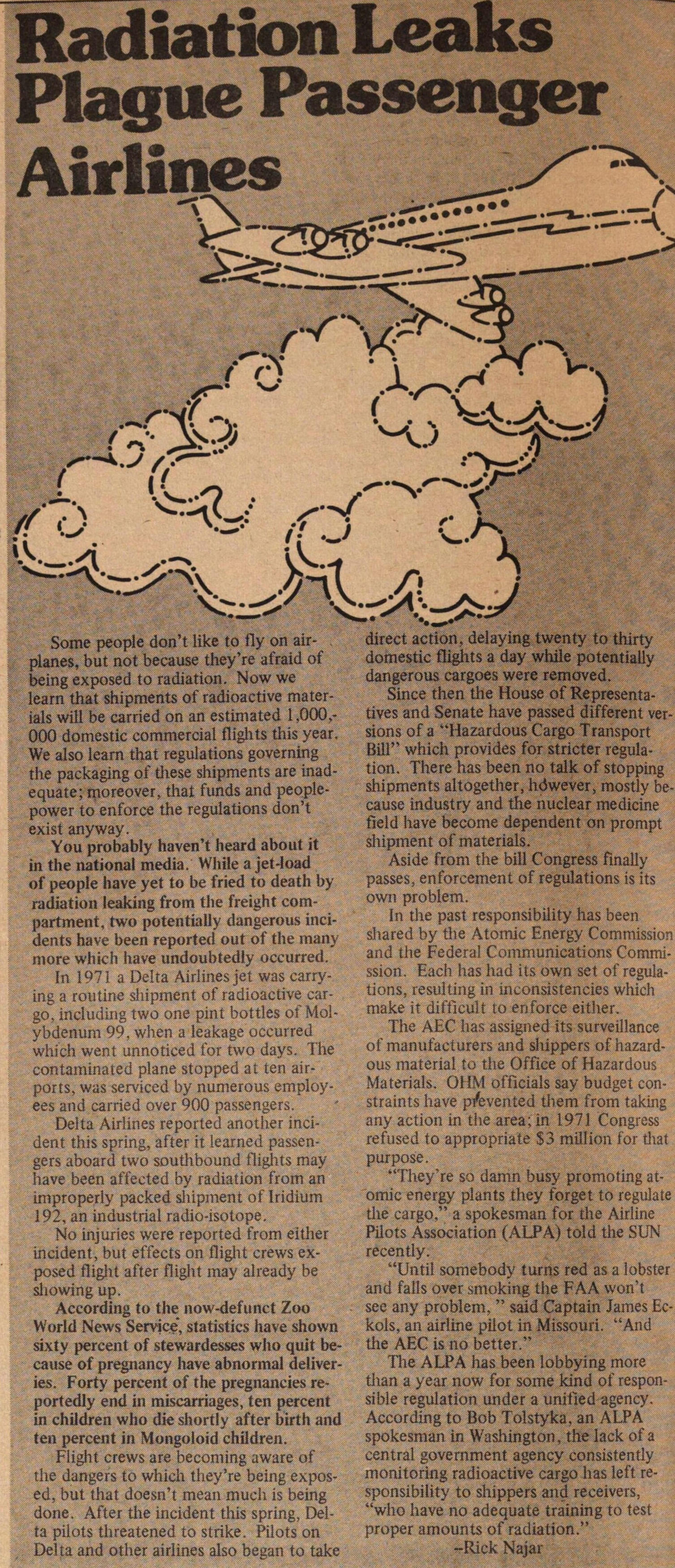Radiation Leaks Plague Passenger

Radiation Leaks Plague Passenger Airlines
Some people don't like to fly on airplanes, but not because they're afraid of being exposed to radiation. Now we learn that shipments of radioactive materials will be carried on an estimated 1 ,000,000 domestic commercial fliglits this year. We also learn that regulations governing the packaging of these shipments are inadequate; moreover, that funds and peoplepower to enforce the regulations don't exist anyway.
You probably haven 't heard about it in the national media. While a jet-load of people have yet to be fried to death by radiation leaking from the freight compartment, two potentially dangerous incidents have been reported out of the many more which have undoubtedly occurred.
In 1971 a Delta Airlines jet was carrying a routine shipment of radioactive cargo, including two one pint bottles of Molybdenum 99, when a leakage occurred which went unnoticed for two days. The contaminated plane stopped at ten airports, was serviced by numerous employees and carried over 900 passengers.
Delta Airlines reported another incident this spring, after it learned passengers aboard two southbound flights may have been affected by radiation from an improperly packed shipment of Iridium 192, an industrial radio-isotope.
No injuries were reported from either incident, but effects on flight crews exposed flight after flight may already be showing up.
According to the now-defunct Zoo World News Service, statistics have shown sixty percent of stewardesses who quit because of pregnancy have abnormal deliveries. Forty percent of the pregnancies reportedly end in miscarriages, ten percent in children who die shortly after birth and ten percent in Mongoloid children.
Flight crews are becoming aware of the danger's to which they're being exposed, but that doesn't mean much is being done. After the incident this spring, Delta pilots threatened to strike. Pilots on Delta and other airlines also began to take direct action, delaying twenty to thirty domestic flights a day while potentially dangerous cargoes were removed.
Since then the House of Representatives and Senate have passed different versions of a "Hazardous Cargo Transport Bill" which provides for stricter regulation. There has been no talk of stopping shipments altogether, however, mostly because industry and the nuclear medicine field have become dependent on prompt shipment of materials.
Aside from the bill Congress finally passes, enforcement of regulations is its own problem.
In the past responsibility has been shared by the Atomic Energy Commission and the Federal Communications Commission. Each has had its own set of regulations, resulting in inconsistencies which make it difficult to enforce either.
The AEC has assigned its surveillance of manufacturers and shippers of hazardous material to the Office of Hazardous Materials. OHM officials say budget constraints have prevented them from taking any action in the area; in 1971 Congress refused to appropriate $3 million for that purpose.
"They're so damn busy promoting atomic energy plants they forget to regulate the cargo," a spokesman for the Airline Pilots Association (ALPA) told the SUN recently.
"Until somebody turns red as a lobster and falls over smoking the FAA won't see any problem, " said Captain James Eckols, an airline pilot in Missouri. "And the AEC is no better."
The ALPA has been lobbying more than a year now for some kind of responsible regulation under a unified agency. According to Bob Tolstyka, an ALPA spokesman in Washington, the lack of a central government agency consistently monitoring radioactive cargo has left responsibility to shippers and receivers, "who have no adequate training to test proper amounts of radiation.
- Rick Najar
Article
Subjects
Freeing John Sinclair
Old News
Ann Arbor Sun